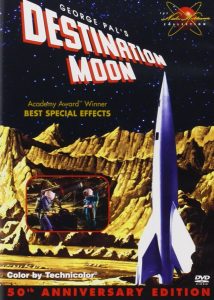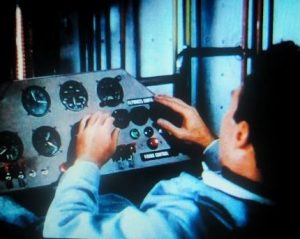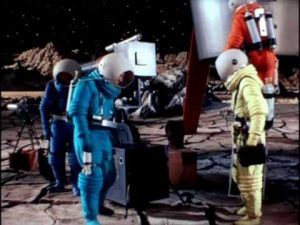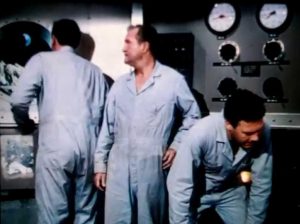Destination Moon (1950), starring John Archer, Warner Anderson, Tom Powers, Dick Wesson, based on a script by Robert Heinlein
![]() Although I’d heard of Destination Moon years ago, I only saw it for the first time last night. It was enjoyable, but with a strange feeling of nostalgia. Released in 1950, it was an attempt at a look into the future — man’s first landing on the moon.
Although I’d heard of Destination Moon years ago, I only saw it for the first time last night. It was enjoyable, but with a strange feeling of nostalgia. Released in 1950, it was an attempt at a look into the future — man’s first landing on the moon.
Some things they film got very right, and (naturally enough) got some things very wrong. However, at the outset, I do want to say that the acting was fine, and things looked authentic. If the U.S.A. had launched an atomic-powered rocket to the moon, it could have realistically looked like the movie’s conception. Not surprising, since the script was written by one of the great science fiction authors of the time, Robert Heinlein.
Movie review of Destination Moon
The basic premise has a consortium of American businessmen bankrolling a very ambitious project. That project is: the first manned flight to the moon. They are doing this for the most patriotic of reasons. They know that if America doesn’t, the communist U.S.S.R. will. This will mean the moon could become a launching ground for raining missiles on the Earth. However, there are forces that don’t want them to launch their atomic-powered rocket. These people will use every legal means to prevent it …
This leads to the induced drama of having to launch the flight early — in 17 hours. At the time, this was meant to give some conflict — the race against time. In hindsight, however, it’s somewhere between silly and ridiculous. Likewise, the concept of the ship made perfect sense at the time. The atomic rocket ship flies to the moon. Once there, it lands on its tail. For the return trip, it launches from there and glides into earth’s atmosphere . However, in reality, the idea of launching an atomic-powered rocket is virtually unthinkable. An accident in lift-off would be catastrophic — think of the Challenger disaster.
Despite the 17-hour deadline and a last-minute replacement, our four astronauts take off. They experience the G-forces of lift off, weightlessness, and eventually land on the moon. But they have insufficient fuel to return home safely. I won’t spoil the ending. I will say that the acting is good, and the bravery of the crewman who volunteers to remain behind resonates. The final solution is appropriately clever, as well.
Editorial review of Destination Moon, courtesy of Amazon.com
When production on Destination Moon began in 1949, everything about the project was state of the art. The great science fiction author Robert Heinlein co-wrote the script (based on his novel Rocketship Galileo) and served as technical advisor. The film’s astronomical visions were realized by Chesley Bonestell, whose artwork virtually defined the look of space travel at the dawn of the rocket era. Destination Moon is even noted in NASA’s official timeline of space travel history, and almost inevitably won the Academy Award for Best Special Effects. It remains a milestone film, not so much as classic science fiction but–like 2001: A Space Odyssey 18 years later–as an attempt to visualize the reality of space exploration. (To educate the audience on this topic, Woody Woodpecker makes an animated guest appearance, hosting an instructional film on the basics of rocketeering.)
The movie now seems quaintly nostalgic, and its depiction of man’s first lunar landing is inaccurate on several details. Taken in context, however, it remains impressively authentic, and conveys the same charm and wonder of the later classic Forbidden Planet. The motivation for the lunar conquest remains military: the country that controls the moon will control the Earth, and cold war paranoia fuels the mission of the rocket ship Luna, which blasts off from the Mojave desert carrying four daring astronauts.
The stalwart crew consists of noted scientists and engineers, but Everyman Joe Sweeney (Dick Wesson) is aboard for broad audience appeal; he’s the kind of Bronx-born guy who pronounces “Earth” as “oith” and complains that the moon has “no beer, no babes, no baseball.” But when a payload crisis threatens the crew’s safe return to Earth, Joe rises to the occasion. It’s all a bit goofy now, but Destination Moon is still a wonderful movie, bursting with the awe and enthusiasm that would eventually lead to “one giant leap for mankind.” —Jeff Shannon






